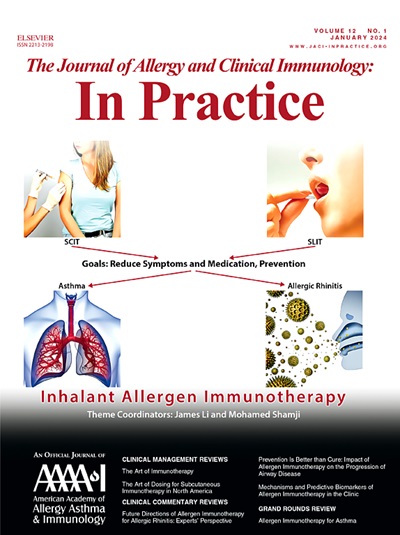FPIES中的共同决策。
IF 8.2
1区 医学
Q1 ALLERGY
Journal of Allergy and Clinical Immunology-In Practice
Pub Date : 2025-06-01
DOI:10.1016/j.jaip.2025.03.008
引用次数: 0
摘要
食物蛋白诱导的小肠结肠炎综合征(FPIES)是一种非ige介导的食物过敏,表现为大量呕吐、嗜睡和可能发展为严重脱水和低血压。迟发性血性腹泻也可能是一个特征,但通常发生在新生儿。由于非特异性症状和没有针对该疾病的特异性实验室检查,FPIES可能被误诊。目前对FPIES病理生理学的了解非常有限。临床管理主要依靠病例系列、病例报告、非对照观察研究和专家意见,而不是对照研究和过多的机械研究。因此,由于缺乏明确指出单一最佳行动方案的高质量试验,在FPIES中有多个领域的护理对偏好敏感,依赖于患者的价值观和偏好。虽然在某种程度上,这可能意味着研究和患者护理方面存在重大的知识差距和未满足的需求,但在另一种意义上,这代表了一个机会,可以通过共同决策,随着研究的不断发展,以一种更适合患者个人或家庭价值观和偏好的方式来发展患者护理。越来越多的人认识到,FPIES对患者和家庭的负担是巨大的,有机会利用特殊的护理选择来帮助减轻这种负担。本次论坛希望讨论当前FPIES护理可以发展的领域,以纳入更多的情境化,偏好敏感的方法,涉及共同决策,为每个患者提供最佳管理。本文章由计算机程序翻译,如有差异,请以英文原文为准。
Shared Decision-Making in Food Protein–Induced Enterocolitis Syndrome
Food protein–induced enterocolitis syndrome (FPIES) is a non–IgE-mediated food allergy presenting with profuse vomiting, lethargy, and potential progression to severe dehydration and hypotension. Delayed-onset bloody diarrhea may also be a feature, though generally in neonates. FPIES can be misdiagnosed due to nonspecific symptoms and the fact that there is no laboratory test specific for the disease. There is currently very limited understanding of the FPIES pathophysiology. Clinical management relies mostly on case series, case reports, uncontrolled observational studies, and expert opinion rather than controlled studies and a plethora of mechanistic research. As a result, there are multiple areas in FPIES where care is preference-sensitive and dependent on patient values and preferences, given the lack of high-quality trials that clearly indicate a single best course of action. While in some vain this may signify major knowledge gaps and unmet needs in research and patient care, in another sense, this represents an opportunity to evolve patient care in a way that may be more tailored toward individual patient or family values and preferences through shared decision-making as the research continues to evolve. There has been increased recognition that the burden of FPIES on patients and families is substantial, and there is opportunity to take advantage of particular care options to help mitigate this burden. This rostrum wishes to discuss areas where current FPIES care can be evolved to incorporate a more contextualized, preference-sensitive approach, involving shared decision-making, to provide the optimal management to each individual patient.
求助全文
通过发布文献求助,成功后即可免费获取论文全文。
去求助
来源期刊

Journal of Allergy and Clinical Immunology-In Practice
ALLERGYIMMUNOLOGY-IMMUNOLOGY
CiteScore
11.10
自引率
9.60%
发文量
683
审稿时长
50 days
期刊介绍:
JACI: In Practice is an official publication of the American Academy of Allergy, Asthma & Immunology (AAAAI). It is a companion title to The Journal of Allergy and Clinical Immunology, and it aims to provide timely clinical papers, case reports, and management recommendations to clinical allergists and other physicians dealing with allergic and immunologic diseases in their practice. The mission of JACI: In Practice is to offer valid and impactful information that supports evidence-based clinical decisions in the diagnosis and management of asthma, allergies, immunologic conditions, and related diseases.
This journal publishes articles on various conditions treated by allergist-immunologists, including food allergy, respiratory disorders (such as asthma, rhinitis, nasal polyps, sinusitis, cough, ABPA, and hypersensitivity pneumonitis), drug allergy, insect sting allergy, anaphylaxis, dermatologic disorders (such as atopic dermatitis, contact dermatitis, urticaria, angioedema, and HAE), immunodeficiency, autoinflammatory syndromes, eosinophilic disorders, and mast cell disorders.
The focus of the journal is on providing cutting-edge clinical information that practitioners can use in their everyday practice or to acquire new knowledge and skills for the benefit of their patients. However, mechanistic or translational studies without immediate or near future clinical relevance, as well as animal studies, are not within the scope of the journal.
 求助内容:
求助内容: 应助结果提醒方式:
应助结果提醒方式:


